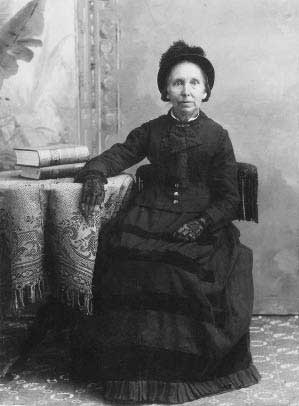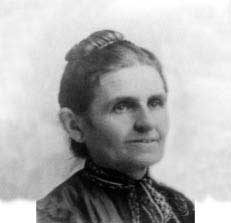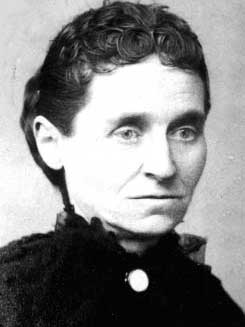Chapter Six
“Oh, Naught but the Spirit’s Divinest Tuition”
Two, of a household band,
Two, in the flush of youth,
Came hither from their home afar,
Led Zionward, by Faith’s bright star,
And love of God and Truth.
—Emily Hill Woodmansee
![]()

Martha Webb Campkin Young
After Martha Campkin arrived in the Valley, she married Thomas Young—sixteen years her junior—who had promised her dying husband that he would take care of her and make sure that she and the children got safely to Zion. A family story exists that not one of Martha’s children lost a finger or toe to frostbite, partly because Thomas Young would rub their hands and feet. In 1860, Martha, Thomas, and her five children settled in Three Mile Creek (now Perry, Utah), where many of their descendants live today. They had three children together.
Martha was an industrious woman; she was known as a good cook and an excellent housekeeper, and she and her daughters braided straw hats as a small business. Family tradition holds that the family also raised produce that they took to the railroad town of Corinne and for which they were paid in gold dust. Known for their hospitality, she and her family permitted travelers to camp on their farmland. Martha was stalwart and faithful to the gospel all the days of her life. She died in Perry, at the age of seventy-eight.1

Julia Hill Ivins
One of the rescuers who answered Brigham Young’s call to rescue the Saints out on the plains was Israel Ivins. He was one of the few who stayed with the Willie company, while others went in search of the Martin company. He escorted the Willie company all the way to the Valley. In February 1857, three months after her arrival in the Salt Lake Valley, Julia Hill became Israel’s second wife, with the approval of his first wife, Anna Lowrie Ivins. Anna had two living children at the time: Caroline, who was twelve, and Anthony, a five-year-old.
Shortly after Israel and Julia were wed, Israel moved his families to the Provo area. He did not want them in the Salt Lake Valley with the approach of Johnston’s Army. Returning to Salt Lake the next year proved a hardship to Julia and her newborn son, Israel Junior. Baby Israel died within a month of their return. Ultimately, Julia and Israel had eight children together, four of whom died before the age of two.
Julia’s experiences on the Willie trek helped prepare her for these difficult times and also strengthened her for the work she did in helping to settle the Dixie Mission in St. George, Utah.
The families of Julia and Anna lived harmoniously together. Julia took charge of the daily running of the households, while Anna worked in the St. George Temple.2 The town of Ivins, near St. George, is named after Israel and Anna’s son Anthony.
Israel, Anna, Julia, and Julia’s son Frank (who died at eight months, but whom she named after her dear brother) are all buried in the old St. George cemetery.
Julia was a virtuous and righteous woman all the days of her life. Her patriarchal blessing says this of her: “He was well pleased . . . when you received the gospel. His angels rejoiced over you at your baptism. . . . You came in with a pure heart and a contrite spirit. You have left your [earthly] Father’s home and your friends and have come unto Zion that you might fulfill all the promises of your [Heavenly] Father.”3
When Julia died unexpectedly at age sixty-three, Emily penned tender lines, entitled “My Sister,” in memory of her beloved sister. An excerpt follows:
My Sister
In loving remembrance of Julia Hill Ivins, suddenly called Home, February 14, 1895
Two, of a household band,
Two, in the flush of youth,
Came hither from their home afar,
Led Zionward, by Faith’s bright star,
And love of God and Truth.
Boughs from a parent stem,
By sacred kinship wed,
Are parted—One of them
Is left, and One is dead. . . .
Hail, ransomed, cheery soul,
Rescued from earthly bands,
Uplifted from this world of ours,
Thou art at home amid the flowers
That bloom in fairer lands.
Thou art at home indeed
With friends, beloved of yore,
From all affliction freed—
Where vexing cares are o’er.
Restful, the blissful change,
Yet active still thou’lt be,
Thy useful efforts will not cease—
Rather love’s labors will increase
And bring more joy to thee.
Expanded is thy scope,
Exalted is thy sphere—
And yet we fondly hope
Thou wilt at times be near. . . .
Life’s span is short at best
Precious is time and fleet
Father, assist us, lest we fail,
Assist us, that we may prevail
And all our tasks complete!
Sweet Mercy shuts out none
From bliss, who’ve bravely striven;
To such is victory given
Through the Atoning One!
Triumphant words—Well done!
For life long toil, Divine amends,
Full compensation, true success
Comprising endless happiness
Shared with delightful friends.
Nevertheless today
In loneliness we bow
Lord, be our present stay
Uphold and cheer us NOW.4

Emily Hill Woodmansee
In June 1857, when she was just twenty-two years old, Emily married thirty-five-year-old handcart rescuer William Gill Mills as his second wife. William was a poet in his own right and had written the words to “Arise, O Glorious Zion,” found in the 1985 Hymns of The Church of Jesus Christ of Latter-day Saints.5 He and his first wife, Louisa Avelina Sleater, did not have any children. In October 1859, Emily and William had a daughter, whom they named Avelina. William and Emily also adopted nine-year-old Sarah Alexandrina (Alexina) Bray, who had come across the plains in the 1855 Milo Andrus company, and whose mother had passed away in 1859.6 In 1860, William asked Brigham Young to send him on a mission to England,7 and Louisa went with him, leaving Emily, Avelina, and Alexina alone in Salt Lake City. Emily provided for herself, Avelina, and Alexina for four years by taking in boarders. At some point, whether in England or back in the states, William was excommunicated and subsequently wrote Emily renouncing polygamy, his marriage to her, and his child.8
Of that experience, Emily said: “No one can realize what such an ordeal is, unless they have passed through it. All that I had hitherto suffered seemed like child’s play compared to being deserted by the one in whom I had chosen to place the utmost confidence.”9 History of Utah states: “But she was a bright and capable business woman, and by her industry succeeded not only in supporting herself [and her children], but in purchasing a home.”10
In 1864, Emily married Joseph Woodmansee, with whom she had eight additional children, two of whom died as infants. She was his third wife. History of Utah gives an additional tribute to her: “Mrs. Woodmansee has seen many reverses, but her innate courage and ability have made her equal to all occasions. Her husband having lost heavily in mining speculations, she again entered upon a business career, and made a phenomenal success in real estate for several years.”11
In 1869, thirteen years after surviving the hardships of the crossing, Emily penned her feelings about “her sisters in Zion,” the women who had helped her and whom she had helped. She titled this ten-verse poem “Song of the Sisters of the Female Relief Society.” She originally set the song to the tune “Hail to the Brightness of Zion’s Glad Morning.”
Song of the Sisters of the Female Relief Society
[Words that are in the current hymn “As Sisters in Zion” are in brackets]
As sisters in Zion, we’ll all pull [work] together,
The blessings of God on our labors we’ll seek;
We’ll build up his Kingdom with earnest endeavor;
We’ll comfort the weary, and strengthen the weak.
We’ll turn from our follies, our pride and our weakness,
The vain, foolish fashions of Babel despise;
We’ll seek for the garments of truth and of meekness,
And learn to be useful and happy and wise.
We’ll wear what is sensible, neat and becoming
The daughters of Zion—the children of light;
We’ll work with a will, while the angels are scanning
Our aims and our actions from morning till night.
We’ll bring up our children to be self sustaining;
To love and to do what is noble and right;
When we rest from our labors, these dear ones remaining,
Will bear off the Kingdom and “fight the good fight.”
Nor shall our attention be wholly restricted
To training our children or shaping our dress;
The aged, the feeble, and poor and afflicted,
Our labors shall comfort, our efforts shall bless.
“The Lord hath established the cities of Zion,
The poor of his people are trusting in Him.”
He makes us a source for His poor to rely on;
Oh! shall we not brighten the eyes that are dim.
Oh! shall we not hasten to soothe the condition
Of the humble, the needy, the honest and pure?
Oh! let us remember, whate’er our amibition—
’Tis our duty, our mission, to comfort the poor.
’Tis the office of Angels, conferred upon woman;
[The errand of angels is given to women,]
And this is a Right that, as woman, we claim;
[And this is a gift that, as sisters, we claim;]
To do whatsoever is gentle and human;
To cheer and to bless in humanity’s name.
How vast is our vision; how wondrous our mission,
[How vast is our purpose, how broad is our mission,]
If we but fulfill it in spirit and deed.
Oh, naught but the Spirit’s divinest tuition
Can give us the wisdom to truly succeed.
Then, as sisters in Zion, we’ll all pull together,
The blessings of God on our labors we’ll seek;
We’ll build up his Kingdom with earnest endeavor;
We’ll comfort the weary, and strengthen the weak.12
This poem resided unnoticed in the Church archives for over 116 years, until 1985, when the Hymn Book Executive Committee under the direction of Brother Michael Moody searched for a suitable theme for the sisters of the Relief Society. Emily’s poem was located, taken out, and put to music by Janice Kapp Perry. The new hymn, which is to be sung “resolutely,” is entitled “As Sisters in Zion” and now serves as something of an anthem for the women of the Church. It is Hymn No. 309 in the 1985 edition of the Hymns of The Church of Jesus Christ of Latter-day Saints.
The hymn’s inclusion in the hymnal is a direct fulfillment of the promise made to young Emily in the priesthood blessing given to her by Elder John Halliday prior to leaving England that if she would remain faithful to her testimony of Jesus Christ throughout her life, she would influence the world by the thousands through her prose and verse.13 Perhaps she has influenced millions, not merely thousands, as her song is sung in languages across the world.
Emily was faithful throughout her life to her testimony of Jesus Christ. Her poetry was published in the Improvement Era, the Young Woman’s Journal, and the Women’s Exponent, and the 1927 LDS Church hymnbook contained eight of her hymns (see pages 73 through 80). She passed away October 6, 1906, at the age of seventy.
Notes Chapter Six: “Oh, Naught but the Spirit’s Divinest Tuition”
Epigraph: Woodmansee, “My Sister,” in Abegg, Poetry of Emily Woodmansee, 281.
^1. Ririe, “Life Story of Martha Webb Campkin Young.”
^2. Allphin, Tell My Story, Too, 53.
^3. Patriarchal blessing of Julia Hill Ivins, given October 31, 1870, St. George, Utah. Copy in possession of author.
^4. Woodmansee, “My Sister,” in Abegg, Poetry of Emily Woodmansee, 281–83.
^5. William G. Mills, “Arise, O Glorious Zion,” in Hymns (1985), no. 40.
^7. Woodmansee in Crocheron, Representative Women of Deseret, 86–87.
^10. Whitney, History of Utah, 594.
^12. Woodmansee, “Song of the Sisters of the Female Relief Society,” in Abegg, Poetry of Emily Woodmansee, 405.
^13. Woodmansee in Crocheron, Representative Women of Deseret, 85.